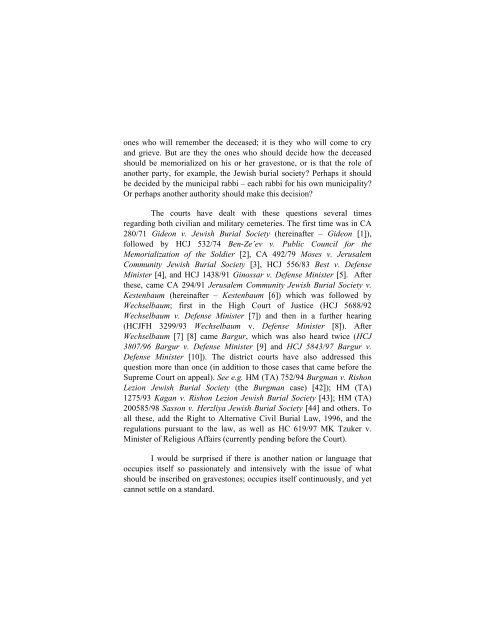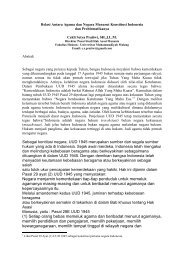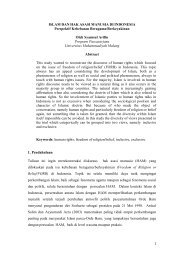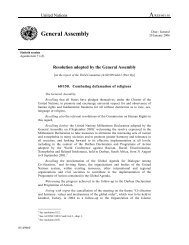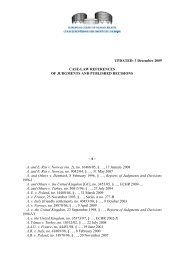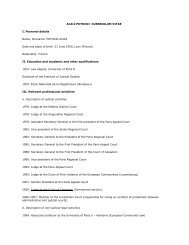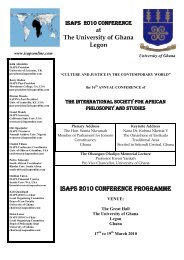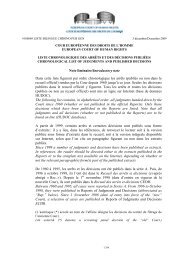Fredrika Shavit v. Rishon Lezion Jewish Burial Society
Fredrika Shavit v. Rishon Lezion Jewish Burial Society
Fredrika Shavit v. Rishon Lezion Jewish Burial Society
You also want an ePaper? Increase the reach of your titles
YUMPU automatically turns print PDFs into web optimized ePapers that Google loves.
ones who will remember the deceased; it is they who will come to cry<br />
and grieve. But are they the ones who should decide how the deceased<br />
should be memorialized on his or her gravestone, or is that the role of<br />
another party, for example, the <strong>Jewish</strong> burial society? Perhaps it should<br />
be decided by the municipal rabbi – each rabbi for his own municipality?<br />
Or perhaps another authority should make this decision?<br />
The courts have dealt with these questions several times<br />
regarding both civilian and military cemeteries. The first time was in CA<br />
280/71 Gideon v. <strong>Jewish</strong> <strong>Burial</strong> <strong>Society</strong> (hereinafter – Gideon [1]),<br />
followed by HCJ 532/74 Ben-Ze’ev v. Public Council for the<br />
Memorialization of the Soldier [2], CA 492/79 Moses v. Jerusalem<br />
Community <strong>Jewish</strong> <strong>Burial</strong> <strong>Society</strong> [3], HCJ 556/83 Best v. Defense<br />
Minister [4], and HCJ 1438/91 Ginossar v. Defense Minister [5]. After<br />
these, came CA 294/91 Jerusalem Community <strong>Jewish</strong> <strong>Burial</strong> <strong>Society</strong> v.<br />
Kestenbaum (hereinafter – Kestenbaum [6]) which was followed by<br />
Wechselbaum; first in the High Court of Justice (HCJ 5688/92<br />
Wechselbaum v. Defense Minister [7]) and then in a further hearing<br />
(HCJFH 3299/93 Wechselbaum v. Defense Minister [8]). After<br />
Wechselbaum [7] [8] came Bargur, which was also heard twice (HCJ<br />
3807/96 Bargur v. Defense Minister [9] and HCJ 5843/97 Bargur v.<br />
Defense Minister [10]). The district courts have also addressed this<br />
question more than once (in addition to those cases that came before the<br />
Supreme Court on appeal). See e.g. HM (TA) 752/94 Burgman v. <strong>Rishon</strong><br />
<strong>Lezion</strong> <strong>Jewish</strong> <strong>Burial</strong> <strong>Society</strong> (the Burgman case) [42]); HM (TA)<br />
1275/93 Kagan v. <strong>Rishon</strong> <strong>Lezion</strong> <strong>Jewish</strong> <strong>Burial</strong> <strong>Society</strong> [43]; HM (TA)<br />
200585/98 Sasson v. Herzliya <strong>Jewish</strong> <strong>Burial</strong> <strong>Society</strong> [44] and others. To<br />
all these, add the Right to Alternative Civil <strong>Burial</strong> Law, 1996, and the<br />
regulations pursuant to the law, as well as HC 619/97 MK Tzuker v.<br />
Minister of Religious Affairs (currently pending before the Court).<br />
I would be surprised if there is another nation or language that<br />
occupies itself so passionately and intensively with the issue of what<br />
should be inscribed on gravestones; occupies itself continuously, and yet<br />
cannot settle on a standard.


